THAILAND LAND OF SMILES AND SUSTAINABILITY
THAILAND LAND OF SMILES AND SUSTAINABILITY
วันที่นำเข้าข้อมูล 21 Apr 2022
วันที่ปรับปรุงข้อมูล 21 Apr 2022
Thailand, long known to tourists as the Land of Smiles, has emerged as the Land of Sustainability, having responded to the global climate crisis by applying the environmentally friendly growth strategy called the BCG.
Throughout 2022, the Kingdom aims to use its role as host of APEC, the grouping of 21 economies in the Asia Pacific that generates 60 percent of global GDP, to lead by example using the Thai BCG model to drive APEC's priorities and set goals for the region when leaders meet in Thailand in November.
Thailand’s sustainability initiative is attracting billions of dollars worth of investment in major industries such as bioplastics and synthetics, where renewable cane sugar has become the raw material for low-emission, fully recyclable alternatives to fossil fuel-based polymers.
The looming climate crisis is prompting ever louder and more passionate debate.
The Glasgow COP26 summit. Dire predictions that global warming combined with Covid-19’s legacy will plunge millions into poverty. The dilemma of how to deliver sustainable growth.
As calls for solutions reach a crescendo, actions are scarcer than words.
Thailand’s Bio-Circular-Green economy, or BCG, which integrates and synergizes three widely accepted economic approaches, is an eco-friendly model based on innovative industries that generate inclusive, sustainable growth while minimizing waste, pollution and dependence on finite resources.
THAILAND'S BIO-CIRCULAR-GREEN ECONOMY
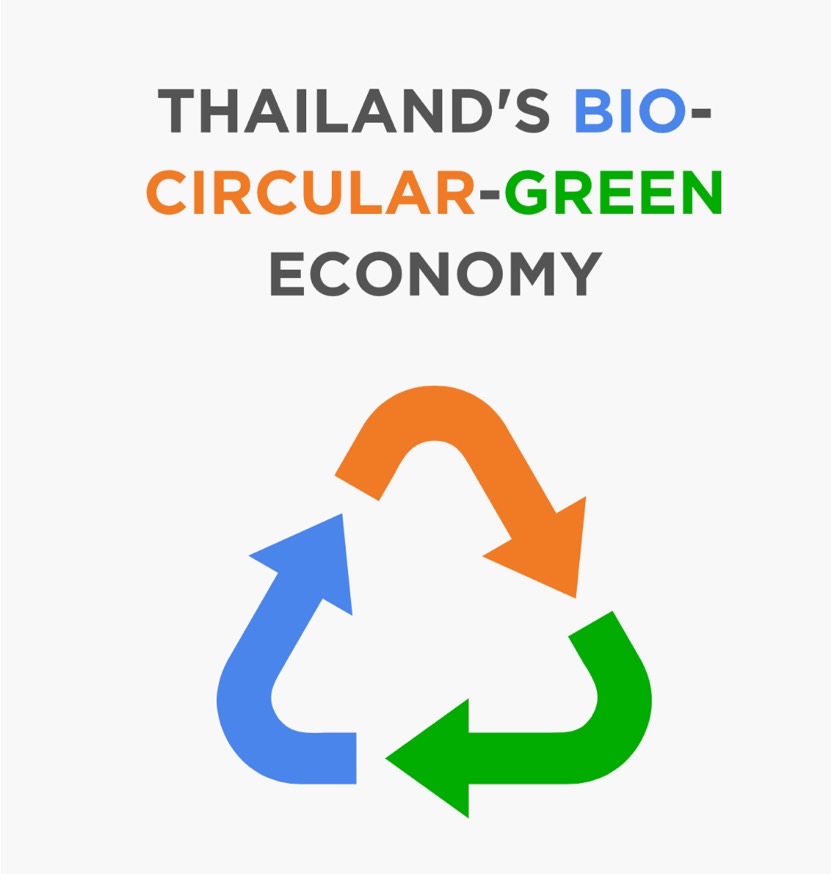
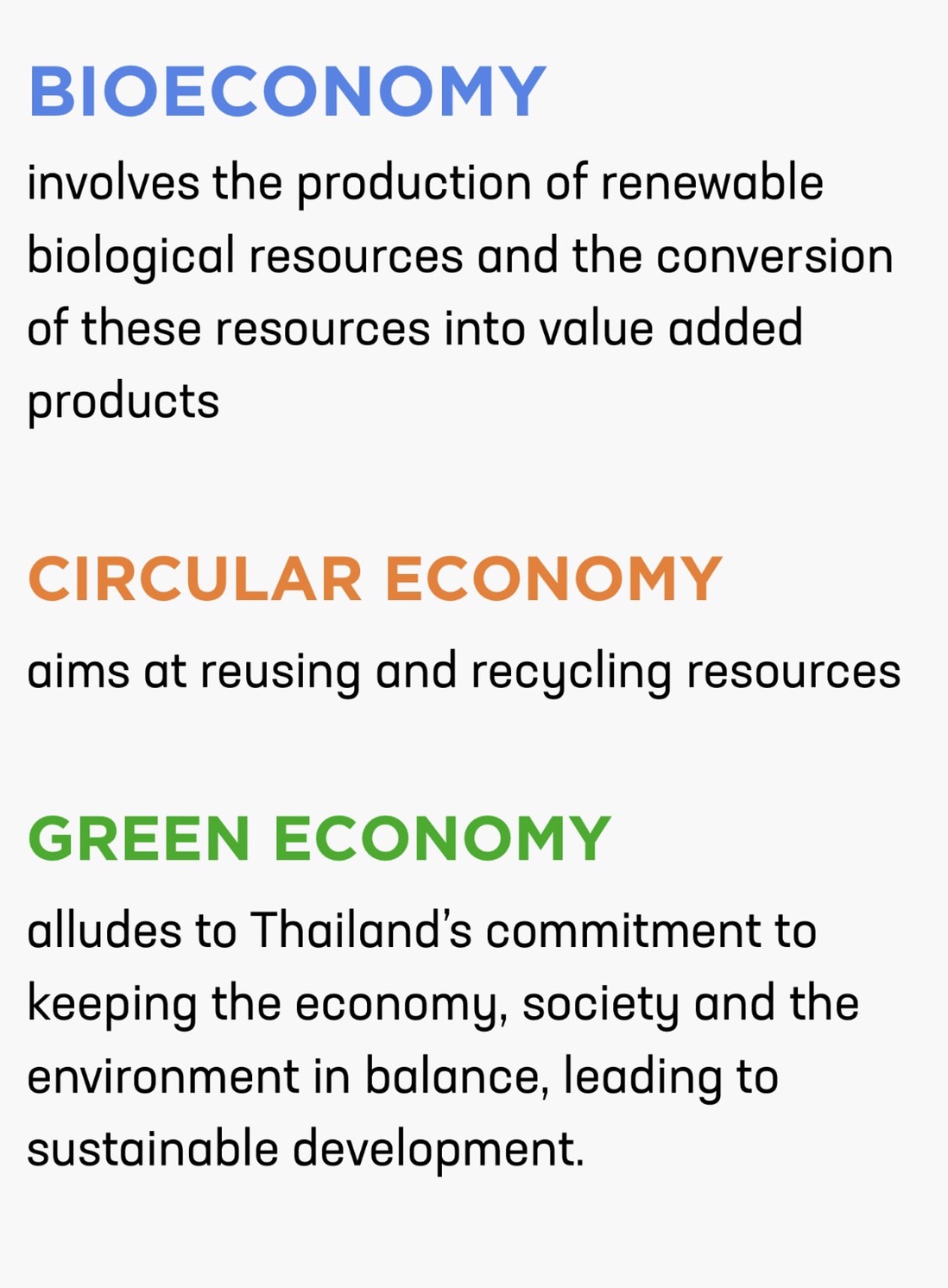
Beyond the Kingdom’s borders, the BCG acronym is not widely known. It soon will be.
“This is the engine driving our APEC host year priorities.”
-Prayut Chan-o-cha,
Prime Minister of Thailand
Throughout 2022, Thailand is the host of Asia Pacific Economic Co-operation (APEC), the 21 economies grouping that includes the world’s three biggest economies, the U.S., China and Japan, and accounts for 60 percent of global economic output and energy use.
APEC’s key priorities for 2022 include accelerating the post-Covid economic recovery through sustainable and inclusive growth.
Thailand’s Prime Minister, Prayut Chan-o-cha, has made it clear his country’s BCG model, key element in the country’s post-pandemic national recovery strategy, will take center stage during its APEC chairmanship.
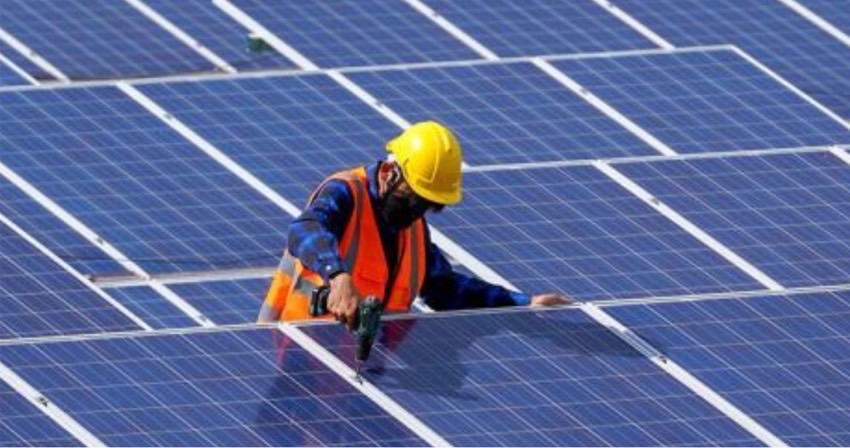
BCG INVESTMENTS SURGE
Investors are already anticipating that BCG technologies will lead Thailand into a brighter, post-Covid future.
In the first nine months of 2021, applications to invest in the Kingdom’s sustainable BCG-related industries more than doubled to $3.8 billion over the same period last year, the Thailand Board of Investment announced in December.
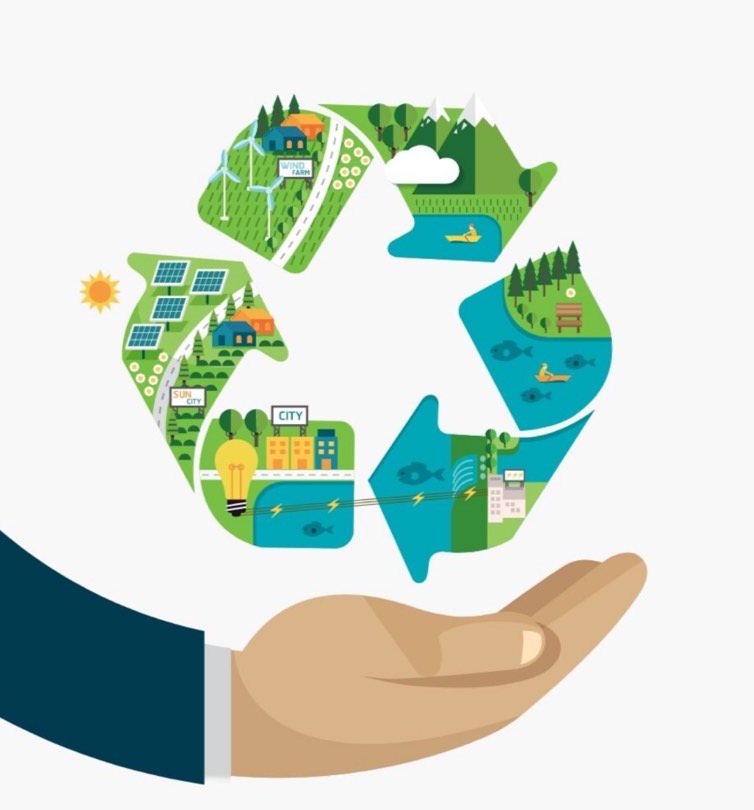
In developing the BCG, Thailand is focusing on four sectors – agriculture and food; bioenergy, biomaterials and biochemicals; medical and wellness; and tourism and the creative economy. And the recent investment surge includes bio-tech projects, eco-friendly food production, recycling, clean energy production, bioplastics and biofuels, according to the BOI.
Such is the predicted growth that by 2025, the Thai government expects the BCG sector to be worth more than $147 billion, or 24 percent of the country’s GDP compared with just over $100 billion, or 21 percent, today.
LAND OF SMILES,
LAND OF SUSTAINABILITY
Sustainability is engrained in Thailand’s DNA and the Kingdom has a track record of being an international first mover.
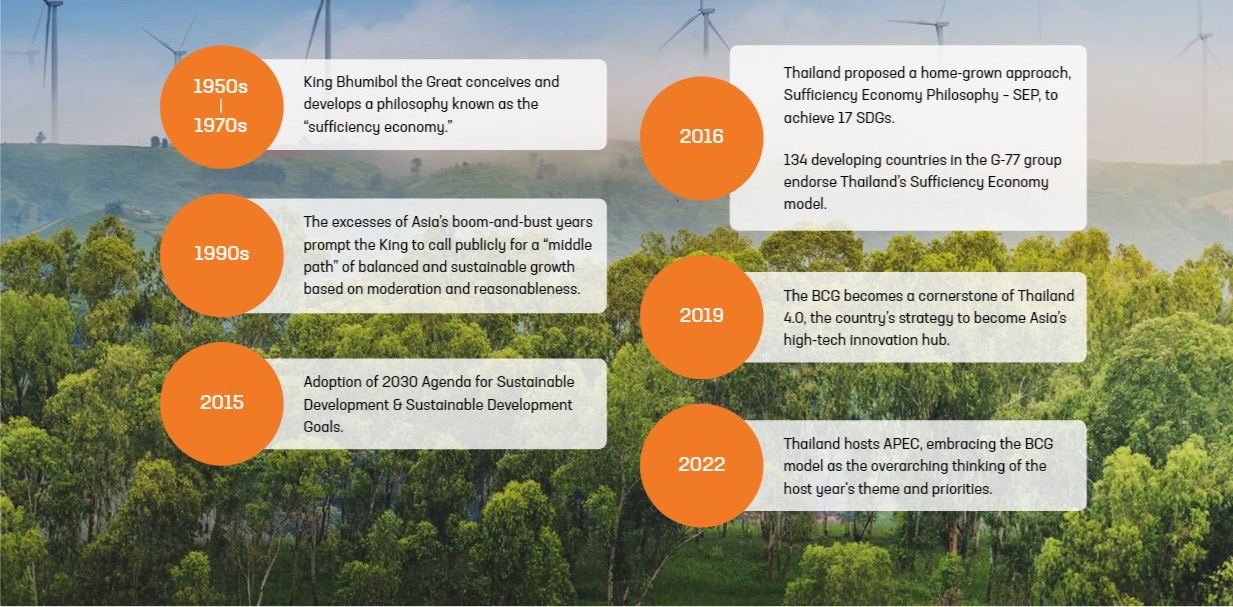
BCG SUCCESS STORIES
So why has the BCG proved so successful for Southeast Asia’s second largest economy?
Fertile Thailand may be best known to tourists as The Land of Smiles, but it is also one of the world’s leading agricultural nations with one of the region’s most biodiverse ecosystems – critical assets for a successful BCG economy.
Simultaneously, Thailand is embracing the digital economy in a strategy known as Thailand 4.0 aimed at becoming the innovation hub of Asia and a fully developed nation by 2035. The BCG and its use of high technology to develop sustainable industries for a post-Covid world is a key driver of those ambitions.
The beating heart of Thailand 4.0 is the Eastern Economic Corridor, a 13,000-square-kilometer high tech zone where BCG-related technologies have combined to make Thailand one of the world’s most important producers of environmentally friendly bioplastics and synthetics.
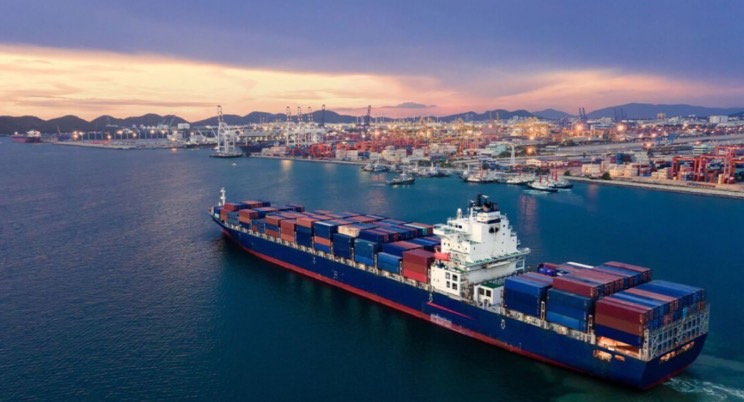
In a classic example of BCG in action, French energy major Total and Dutch biochemical giant Corbion teamed up in 2017 to form a joint venture, Total Corbion PLA, and build a $250 million bioplastics plant in the Eastern Economic Corridor.
The factory, the second largest of its kind in the world, turns Thai-grown sugar cane into polylactic acid, an annually renewable and biodegradable bioplastic that can replace polystyrene and other oil-based polymers while having a 75 percent smaller carbon footprint.
Also in the Eastern Economic Corridor, one of Japan’s most talked-about unicorn start-ups, Spiber Inc, in 2021 opened a $100 million factory to produce, also from sugar biomass, brewed protein from which the company’s revolutionary, market-leading artificial spider silk is made.
Stronger than steel, lighter than aluminium and more flexible than carbon fiber, Spiber’s product, unlike other synthetics such as polyester and nylon, isn’t reliant on fossil fuels or animal resources. Its Thailand factory is the world’s largest production source.
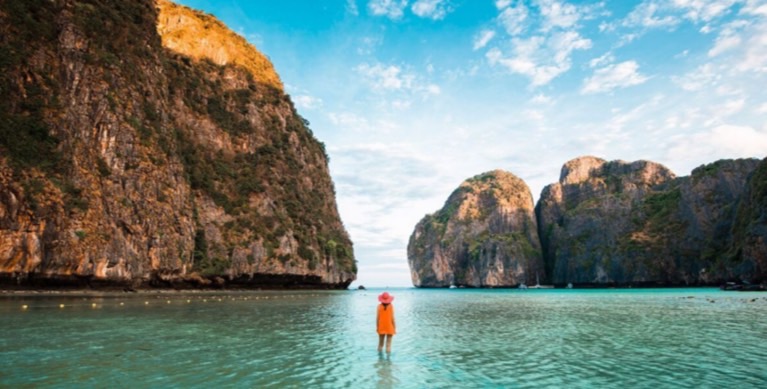
In addition to food and agriculture and biotech, the BCG focuses on two other eco-friendly sectors in which Thailand is internationally famous: medical and wellness, and tourism and the creative economy.
Thailand’s rich cultural history and alluring beaches and landscapes have made it one of the world’s leading tourism destinations, attracting 39.9 million visitors in 2019. Under the BCG model it is also promoting ecotourism in all forms from sustainability through efficient tourist management to development of such niche attractions as gastro-tourism that not only immerses visitors in Thailand’s internationally-renowned cuisine, but also takes them on a journey through the increasingly organic farming methods and ingredients that make Thai food so irresistible.
Similarly, Thailand is one of world’s top medical hubs, not only as a destination for medical tourism, but also as a manufacturing base for high tech medical devices and as a research and development hot spot for Covid-19 vaccines, genomics and biopharmaceuticals – sectors that squarely fall into the BCG category.
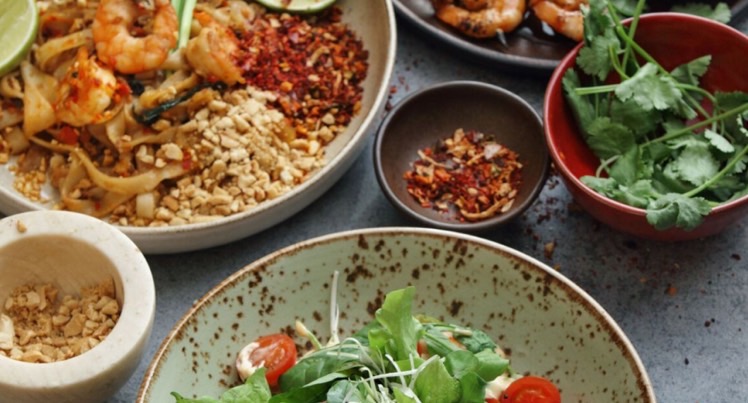
สถานเอกอัครราชทูต ณ กรุงเตหะราน
Office Hours: Sunday to Thursday, 08:30-12:00 and 13:00-16:30 (Except public holidays)